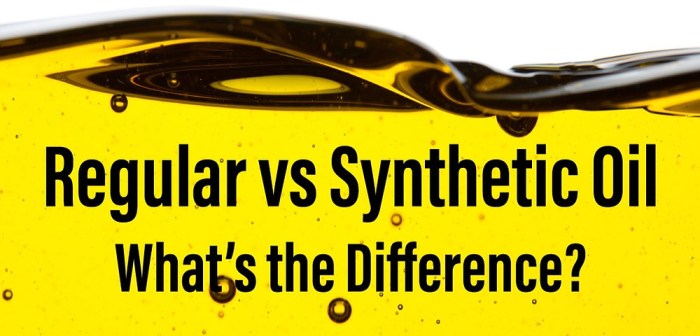Synthetic oil vs regular oil is a debate that has car enthusiasts and everyday drivers buzzing with opinions. Both have their pros and cons, but understanding the differences can make a huge impact on your vehicle’s performance and longevity. From their compositions and manufacturing processes to the additives that keep your engine running smoothly, it’s essential to break down what sets these oils apart. So, let’s dive into the nitty-gritty of these two oil types and see which one might be the better choice for your ride.
As we explore the performance metrics, longevity, environmental impact, cost considerations, user preferences, and even some myths surrounding these oils, you’ll gain a clearer picture of what synthetic and regular oil can offer. Get ready to rev up your knowledge and make an informed choice for your vehicle.
Synthetic Oil vs Regular Oil

In the world of automotive maintenance, one of the most critical decisions an engine owner faces is choosing between synthetic oil and regular oil. Understanding the differences between these two types of engine oils can significantly impact vehicle performance, longevity, and overall maintenance costs.
Definition of Synthetic Oil and Regular Oil

Synthetic oil is a man-made lubricant created from chemical compounds, designed to provide superior engine protection and performance. It typically includes base oils that are synthesized through a chemical process that enhances their stability and efficiency. In contrast, regular oil, often referred to as conventional oil, is derived from refining crude oil. While both types serve the same fundamental purpose of lubricating engine components, their compositions and manufacturing processes set them apart.
Synthetic oils are produced using a more complex process called hydrocracking or gas-to-liquid technology, which allows for more consistent molecular structures and properties. Regular oils undergo a more straightforward refining process that can lead to variations in quality and performance.
Both synthetic and regular oils include additives to enhance their performance. Common additives include detergents, dispersants, anti-wear agents, and viscosity modifiers. These additives serve various purposes, from cleaning engine deposits to preventing wear and maintaining oil stability at high temperatures.
Performance Comparison
When evaluating the performance of synthetic oil compared to regular oil, it’s essential to consider the oil’s behavior under extreme temperatures. Synthetic oils typically perform better in both high and low-temperature environments. They maintain viscosity and flow better in cold conditions, ensuring optimal lubrication during cold starts. Conversely, regular oil may thicken in low temperatures, impacting engine performance.
In terms of engine performance and efficiency, synthetic oil generally offers superior protection against wear and tear. Its advanced lubrication properties help reduce friction, allowing engines to run smoother and more efficiently, which can lead to improved fuel economy. High-stress conditions, such as towing or high-speed driving, also see better lubrication from synthetic oils, reducing the risk of engine damage.
Longevity and Change Intervals
The longevity of engine oil is a vital consideration for vehicle maintenance. Synthetic oil can often last longer between changes, with recommended intervals ranging from 7,500 to 15,000 miles, depending on the manufacturer’s specifications. On the other hand, regular oil typically requires changes every 3,000 to 5,000 miles.
Factors affecting the lifespan of both oil types include driving conditions, engine type, and maintenance practices. For instance, vehicles subjected to frequent stop-and-go traffic may require more frequent oil changes, regardless of the oil type used.
| Engine Type | Synthetic Oil Lifespan | Regular Oil Lifespan |
|---|---|---|
| Standard Engine | 7,500 – 10,000 miles | 3,000 – 5,000 miles |
| Turbocharged Engine | 10,000 – 15,000 miles | 5,000 – 7,500 miles |
| High-Performance Engine | 7,500 – 12,000 miles | 3,000 – 5,000 miles |
Environmental Impact, Synthetic oil vs regular oil
The production and use of synthetic oil versus regular oil come with different environmental implications. Synthetic oils, while often viewed as more efficient, generally require more energy to produce. However, they can lead to less frequent oil changes, potentially reducing overall waste.
Both oil types have varying levels of biodegradability. Regular oils are typically less biodegradable than synthetic oils, which can lead to more significant environmental issues in the event of spills. Oil leaks and spills can result in harmful impacts on soil and water ecosystems, affecting wildlife and plant life.
Statistics indicate that oil spills and leaks contribute significantly to environmental degradation. Synthetic oil spills, while less common due to the longer intervals between changes, can still pose serious environmental risks.
Cost Considerations
When it comes to the financial aspect, synthetic oil is generally more expensive than regular oil. Prices can vary widely depending on the brand and location, but synthetic oil often costs about 2 to 3 times more per quart than conventional oil.
Despite the initial higher cost, synthetic oil can offer long-term savings. Due to its longevity and enhanced performance, using synthetic oil can extend the life of the engine and reduce maintenance costs over time.
| Oil Type | Average Cost per Quart | Estimated Cost Over 5 Years |
|---|---|---|
| Synthetic Oil | $8 – $12 | $500 – $900 |
| Regular Oil | $3 – $5 | $300 – $600 |
User Preferences and Recommendations
Consumer preferences for synthetic versus regular oil often depend on vehicle type and driving habits. Many drivers of high-performance or luxury vehicles prefer synthetic oil due to its superior protection and performance. In contrast, owners of older vehicles or those with low mileage may opt for regular oil, considering it a cost-effective choice.
Based on oil suitability, recommendations vary. For instance, high-performance vehicles benefit from synthetic oil, while daily drivers might find regular oil sufficient.
Some top-rated brands for synthetic oil include Mobil 1, Castrol Edge, and Amsoil, each offering various formulations for different engine needs. For regular oils, brands like Valvoline, Pennzoil, and Quaker State are popular choices, known for their reliable performance.
Myths and Misconceptions
There are several common myths surrounding synthetic oil, including the belief that it can cause leaks in older engines. In reality, synthetic oil is designed to be compatible with all types of engines and may help in sealing existing leaks due to its superior properties.
Another misconception is that regular oil cannot perform adequately in modern engines. While synthetic oil offers advantages, quality regular oils can still provide sufficient protection and performance for many vehicles.
Testimonials from drivers reveal a diverse range of experiences with both oil types. Many synthetic oil users report noticeable improvements in engine performance and efficiency, while regular oil users appreciate the lower cost and satisfactory performance in their vehicles.
Last Point: Synthetic Oil Vs Regular Oil

In conclusion, the choice between synthetic oil vs regular oil ultimately comes down to your specific needs, driving habits, and budget. While synthetic oil offers superior performance and longevity, regular oil can still do the job effectively for many drivers. By weighing the benefits and considerations we’ve discussed, you can decide which oil will keep your engine running smoothly and efficiently for miles to come. Remember, the right oil can make all the difference in maintaining your vehicle’s health and performance!